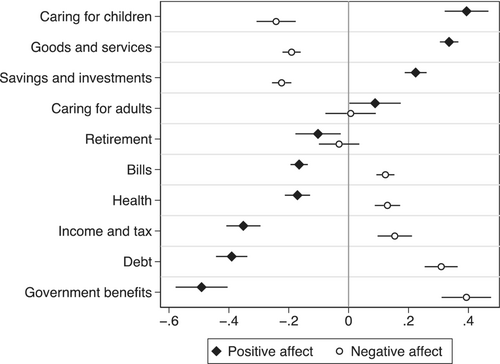The print version of our paper "Everyday Administrative Burden and Inequality" (with Lucie Martin and Orla Doyle) is available now at Public Administration Review. Abstract below. I posted recently about a fascinating paper arguing that subjective experience will/should take greater precedence in public administration research. This is one methodological approach for advancing this.
Administrative burdens create costly experiences for citizens, especially disadvantaged groups. Research to date focuses on how burdens affect outcomes in specific policy contexts, thus little is known about cumulative experiences of burdens in everyday life and their distribution in society. This is the first study to document everyday administrative experiences, accounting for time and well-being costs across 10 domains: tax, retirement, government benefits, bills, goods and services, savings, debt, health, child care, and adult care. Survey results from 2243 UK adults show that administrative tasks are a significant part of everyday life, with time and well-being costs that vary by domain. Benefits-related tasks are particularly costly. There is evidence of distributive effects. Those in poor health and financial insecurity are more likely to engage in salient tasks, such as benefits, but less likely to engage with longer-term tasks including savings and retirement. They experience higher well-being costs, especially during salient tasks.
The nature of the administrative tasks that we surveyed in the UK population are delineated below and the paper gives details of the percentage of people who engaged in these tasks over a day or month (some important design details are provided in the method section) and the amount of time they spent. We also elicited positive and negative emotions during these events using a modified day reconstruction survey.
The associated well-being during each task is shown below, with the coefficients coming from within-person regression models. The paper provides greater detail on how these well-being coefficients are distributed across age, health status, income, and financial well-being, with those in poor health and with lower financial well-being, in general, experiencing high levels of negative affect and lower levels of positive affect during admin tasks compared to other groups.
There are other projects associated with the paper, including a forthcoming paper we have worked on examining the role of administrative burdens in decision-making, using choice experiments. Lucie is currently completing a separate paper on gender aspects of these well-being differences across tasks and is working with the Psychology of Administrative Burdens project to conduct versions of the survey internationally. In our Department at LSE, many colleagues are working on well-being in the context of public policy environments, including a number of projects specifically on the experience of time. Some other specific directions relevant to the current paper include the use of subjective ethnography to dive deeper into the experience of administrative tasks. As noted by Panday in the article I mentioned in the opening paragraph, moving from analysis of lived experience to more direct involvement of people with lived experience of these contexts is another area that many people here have been pursuing.


No comments:
Post a Comment